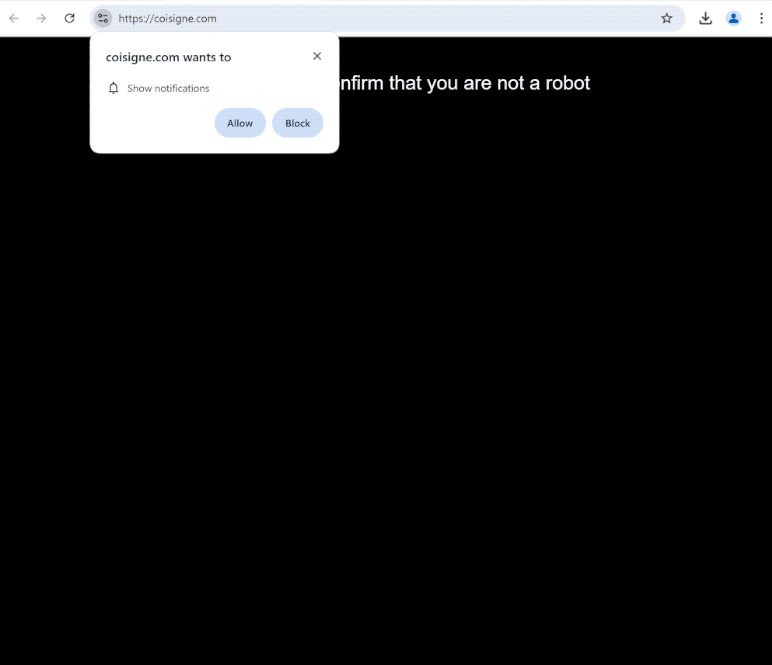Stop coisigne.com notifications
coisigne.com is a deceptive website that uses a legitimate browser feature to deceive users into allowing ads on the desktop. When you get redirected to it, your browser will show a browser alert saying “coisigne.com wants to show notifications”. If you click “Allow”, the site will be able to spam ads on your desktop.
When you get redirected to the site, you will see a black screen and a message saying you need to confirm you are not a robot. The site is otherwise empty. You will also get a browser alert saying “coisigne.com wants to show notifications”. If you click “Allow”, the site will be given the authorization to start spamming ads. These ads will appear similarly to where legitimate system notifications are usually displayed. This can confuse users, tricking them into interacting with them. Avoid interacting with those notifications because you could be exposed to all kinds of malware and scams.
The “show notifications” feature is legitimate but it’s usually misused by questionable sites like coisigne.com to spam ads. If you want to see a site’s content more conveniently on your desktop and know the site is safe, you can permit it to show notifications. For example, if you give a news site permission, it will display important news on your desktop. This permission is easily revoked in the browser’s settings.
Redirects can be a sign of an adware infection, so we recommend scanning your computer with the anti-virus program WiperSoft. And if you have given the site permission to show notifications, you need to revoke it. If you do not know what to do, we have provided the instructions at the very end of the report.
What triggers redirects to sites like coisigne.com?
There are two main triggers for redirects to sites like coisigne.com. They can be triggered by adware infections but in most cases, random redirects happen when users browse questionable websites and do not have an adblocker program installed. Some sites try to spam users with as many ads as possible. For example, sites with pornographic and/or pirated content spam ads, and clicking on anything when browsing those sites will trigger a redirect. Fortunately, a decent adblocker program will be able to block both redirects and regular ads.
If an adware infection is triggering the redirects, you should also notice an increase in regular ads. Infections like adware are pretty minor, but they are annoying. Adware, browser hijackers, and other similar infections are installed accidentally by users via the software bundling method. Said infections get added to popular free programs as extra offers, which are authorized to be installed automatically alongside the programs they’re attached to. These offers are optional but you need to manually deselect them when installing programs. However, this is made difficult by the fact that they are hidden in settings users don’t normally use. This is why software bundling is a controversial installation method.
You should not have any issues preventing unwanted installations if you pay attention when installing free programs. During installation, the installation window will recommend using Default settings. However, if you do that, you will authorize all offers to install. To prevent unwanted installations, you need to use Advanced (Custom) settings. These settings will make all offers visible and give you the option to deselect them. A legitimate program will not use this installation method so it’s recommended to always deselect all offers, even if they initially seem useful. Programs that do use software bundling are generally detected as potential threats by anti-virus programs.
How to stop coisigne.com notifications?
It’s strongly recommended to scan your computer with the anti-virus program WiperSoft to check for an adware infection. Adware is easily removed with an anti-virus program. What’s more, if you don’t already have it, install an adblocker program.
If coisigne.com has permission to show you notifications, revoke it in your browser’s settings. If you need help with navigating your browser’s settings, we have provided the instructions below.
- For Mozilla Firefox: Open Menu (the three bars top-right corner) -> Options -> Privacy & Security. Scroll down to Permissions, press Settings next to Notifications, and remove coisigne.com and any other questionable websites. You can permanently turn off these notification requests by checking the “Block new requests asking to allow notifications” box in the same Notifications settings.
- For Google Chrome: Open Menu (the three dots top-right corner) -> Settings -> Privacy and security -> Site Settings. Click on Notifications under Permissions, and remove coisigne.com and any other questionable websites. You can stop these notification requests permanently by toggling off “Sites can ask to send notifications”.
- For Microsoft Edge: Open Menu (the three dots top-right corner) -> Settings -> Cookies and site permissions -> Notifications. Review which sites have permission and remove coisigne.com and any other questionable websites. You can permanently turn off these notification requests by toggling off “Ask before sending”.
Site Disclaimer
WiperSoft.com is not sponsored, affiliated, linked to or owned by malware developers or distributors that are referred to in this article. The article does NOT endorse or promote malicious programs. The intention behind it is to present useful information that will help users to detect and eliminate malware from their computer by using WiperSoft and/or the manual removal guide.
The article should only be used for educational purposes. If you follow the instructions provided in the article, you agree to be bound by this disclaimer. We do not guarantee that the article will aid you in completely removing the malware from your PC. Malicious programs are constantly developing, which is why it is not always easy or possible to clean the computer by using only the manual removal guide.

